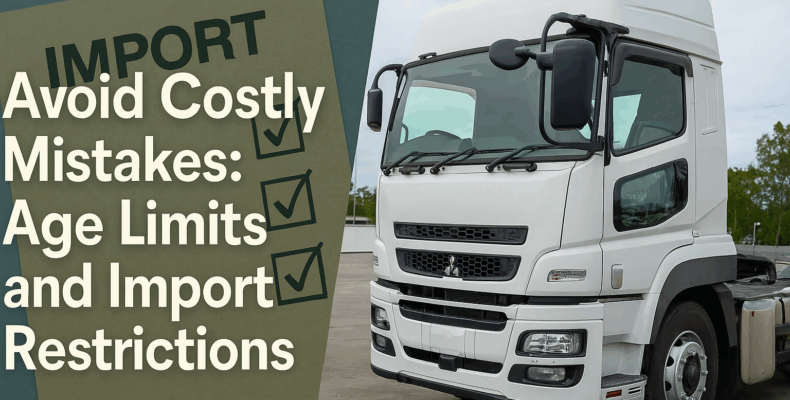Importing a Japanese used truck is a smart investment. However, every country has its own import restrictions, especially when it comes to vehicle age limits. If you’re not careful, you could end up buying a truck that cannot be registered or imported into your country.
To help you avoid expensive errors and delays, this guide explains how age limits work and highlights key regulations for different global markets.
🚛 Why Age Limits Matter When Importing Trucks
Governments set age limits to control emissions, improve road safety, and protect domestic markets. These limits apply to used vehicles, including commercial trucks. If your truck exceeds the allowed age, you may face:
-
Higher import duties
-
Rejection at customs
-
Non-registration penalties
-
Mandatory re-exportation
That’s why it’s essential to verify these restrictions before purchasing your truck in Japan.
🌍 Import Rules by Region: What You Need to Know
Let’s take a look at some of the most common regulations based on destination:
✅ Africa
🇰🇪 Kenya
-
Max vehicle age: 8 years from the year of manufacture
-
Emission standard: Euro 4 or equivalent
-
Special Note: Vehicles must be right-hand drive
🇺🇬 Uganda
-
Max vehicle age: 15 years (but heavy taxes for older vehicles)
-
Environmental levy applies based on age
-
Trucks may receive exemptions for commercial use
🇿🇲 Zambia
-
No strict age limit
-
But high duty for vehicles over 5 years old
-
Roadworthiness test required
✅ Caribbean
🇯🇲 Jamaica
-
Max vehicle age for trucks: 10 years
-
Trucks over 3.5 tons: 15 years
-
Must be inspected and certified before shipping
🇹🇹 Trinidad & Tobago
-
Max age: 4 years for most commercial vehicles
-
Exception: Trucks for agriculture or industrial use
✅ Asia-Pacific
🇵🇭 Philippines
-
Age limit: Only brand-new vehicles allowed
-
Used commercial vehicles need special import permit
-
JEVIC inspection may be required
🇳🇿 New Zealand
-
No official age limit
-
Must pass emission and safety inspection
-
Left-hand drive vehicles not allowed (exceptions apply)
✅ Middle East
🇦🇪 United Arab Emirates
-
Max age: 10 years for trucks and buses
-
Special use vehicles like tankers may be exempt
-
Must comply with GCC safety and emission standards
✅ South America
🇨🇱 Chile
-
Used vehicle imports are heavily restricted
-
Only allowed under certain special programs
-
Must comply with Chilean emission laws
📋 How to Check Import Eligibility for Your Country
Before you purchase a Japanese used truck, follow these steps:
-
Check your local customs authority website
-
Review vehicle age and emissions regulations
-
Ensure the truck’s year of manufacture is clearly documented
-
Ask your exporter for full deregistration and JEVIC (if applicable)
-
Confirm if left-hand or right-hand drive is accepted
🌟 Buy from Trusted Exporters
To avoid paperwork issues or non-compliant trucks, it’s best to work with experienced and trustworthy exporters. They will help you:
-
Confirm export eligibility
-
Provide emission and inspection documents
-
Ensure the truck meets your country’s regulations
👉 We recommend checking out this list:
Top 5 Trusted Japanese Used Truck Exporters for Global Buyers
🧾 Final Thoughts
Age limits and import restrictions may seem like a barrier, but with proper planning, they are easy to manage. Always check local rules before you buy. And most importantly, choose an exporter who understands international compliance.
When done right, importing a Japanese used truck gives you reliability, fuel efficiency, and long-term value—all without legal headaches.
